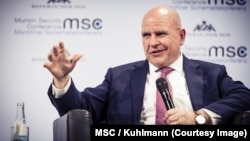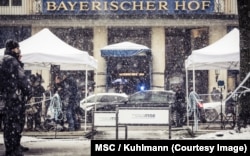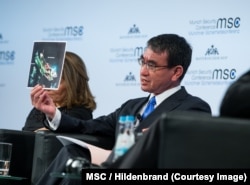Dozens of the world’s political and military leaders, along with thousands of politicians, journalists and security experts descend on southern Germany every year for the Munich Security Conference.
The stated aim is to bring allies and adversaries together, to put dialogue before confrontation. The venue, the historical Bayerischer Hof hotel, seems barely big enough to squeeze everyone in. Organizers say the intimacy forces people to talk.
This year, the 54th conference, there is a palpable sense the world is becoming a more dangerous place.
“This year we meet at a critical time for our nations, and indeed for all humanity,” the United States’ National Security Adviser H.R. McMaster told delegates Saturday.
“We face a range of common threats. Rogue regimes that already imperil international security in the Middle East and northeast Asia,” McMaster added.
North Korea, Syria, Iran
North Korea’s nuclear weapons program has featured throughout the conference. In a thinly veiled warning to China, he called on those countries that continue to offer an economic lifeline to Pyongyang to respect global sanctions.
His concerns were echoed by the Japanese Foreign Minister Taro Kono, who said the international community should beware of being blinded by North Korea’s charm diplomacy during the current Winter Olympic Games in neighboring South Korea.
McMaster also took aim at Syria and Iran.
“We know that Syria and North Korea are not the only rogue states developing, using, spreading dangerous weapons. Now is the time to address serious flaws in the Iran deal and counter Iran’s destabilizing activities, including its development and proliferation of missiles, and its support for terrorist proxies and militias that fuel destructive conflicts across the greater Middle East.”
Iran repeatedly has denied those accusations.
Washington is wary of the growing complexity of the Syrian conflict, analyst Karin von Hippel, director-general of the London-based Royal United Services Institute, said.
“Not just because of the U.S. and Turkey potentially facing each other off, but Russian troops are there, other Gulf country troops are there, the Israelis have been drawn in recently, and of course the Iranians are there. So that really is a very dangerous theater where one little mistake could escalate in really frightening ways.”
WATCH: US-Russia Dispute Forms Backdrop for Tense Munich Security Conference
Iraq recovery
Such an escalation likely would draw in Syria’s neighbors. Iraqi Prime Minister Haider al-Abadi told delegates that the Islamic State terror group, also known as Daesh, poses an enduring threat.
“We intend this year to make it the final year for the existence of Daesh in Iraq. The task which is facing us is stabilization and reconstruction of the areas that have been occupied and destroyed by Daesh. This is a huge task at a time when our oil income has dropped drastically,” al-Abadi told the conference Saturday.
The three-day conference took an added dimension as news broke Friday of the indictments by U.S. Special Counsel Robert Mueller and the Department of Justice against several Russian nationals and companies, for meddling in the 2016 U.S. presidential election. Moscow’s foreign minister dismissed the charges as “blather.”
Further Middle East tensions likely will come under the spotlight Sunday as the Israeli Prime Minister Benjamin Netanyahu, plus the foreign ministers of Iran and Saudi Arabia, are scheduled to address the conference.
















